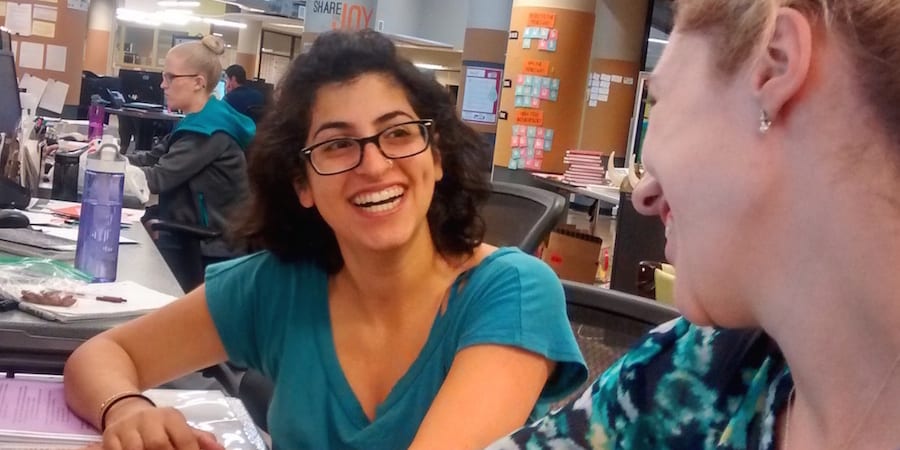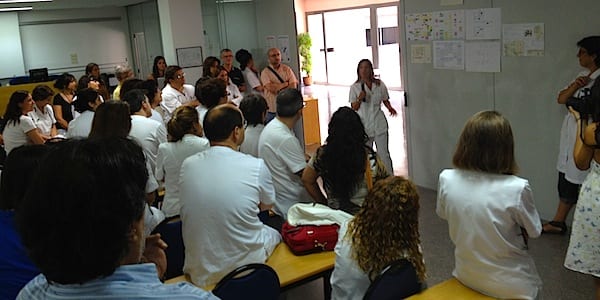
This new column gives a voice to people at the front line
COLUMN - Menlo Innovations may not define itself as a "lean organization" but there is no doubt that its management style is akin to the principles lean teaches. Here, a front-line Menlonian shares her thoughts on the company's culture.
Words: Samah Majadla, software developer and project manager, Menlo Innovations
EDITOR'S NOTE
We always say how important it is to listen to our people and empower them, but how many of us actually do it? More often than not, the front line doesn't have a say in what goes on, which is why Planet Lean has decided to start this new column, written by the people who do the actual work. "What lean did for me" will hopefully help us to understand what those at the gemba really care about, and to adjust our approach to people development accordingly.
Roberto Priolo, Editor
I love my job. I look forward to seeing my co-workers every day. I constantly learn new things and meet inspiring people. I feel supported, both professionally and personally, and have a great amount of trust in the organization. Sure, there are challenges like in any other job, but we all work hard to provide support to one another whenever necessary. Can you say the same about your workplace? I hope so!
SEARCHING FOR THE RIGHT SKILLS
I started working at Menlo after I graduated from college and I must say that within a few weeks I already felt like I had learned more in my time there than I had in years of studying computer science.
While trying to find a job in the software industry, it had seemed like even "entry-level" positions required two to three years of experience. However, the skills that Menlo looks for in the hiring process are different. We require some level of technical knowledge, of course, but I have found that the ability to communicate effectively is valued more than anything else.
It is largely because of this that I was able to begin my career as a software developer. For the following two years, Menlo's open culture and learning-based environment have allowed me to grow a lot as a professional, and as a person.
REAL PEOPLE DEVELOPMENT
I have found that simply showing a willingness to be flexible and provide help to my colleagues opened up many opportunities for my growth.
I was a developer for my first year and a half at Menlo, and when I offered my help and expressed a desire to influence the growth of the team I was given the chance to coach a group of interns this past summer. I am now pairing in as a project manager. There is plenty of room to grow here; you just need a little self-advocacy and motivation!
Because we meet with our clients on a weekly basis, we also have an opportunity to constantly develop our consultative skills. Working in pairs means that we are always improving and developing our way of communicating, teaching, and transferring knowledge. We are expected to learn and grow our skills all the time (languages, developing environments, hardware, and so on), whatever the project we are working on.
DEALING WITH THE BOSSES

I have built a lot of trust with Rich (Sheridan, the CEO) and James (Goebel, the COO), and my desire to learn and contribute to the team has been met with constant support.
In a recent interview with Planet Lean, Rich said that Menlo's biggest breakthrough has been the idea of "pumping fear out of the room." I couldn't agree more, especially in the light of the predicament I have recently found myself in. The company sponsored me for a work visa but I didn't get it, which means that unfortunately I'll have to leave Menlo Innovations in a few months. The support and compassion I have received from everyone in the team has been amazing. It was particularly touching when James wanted to make sure that I knew that I would not be treated any differently now that my role at Menlo had an "expiration date."
In fact, it was after I knew that I would not be able to stay that I started working as a project manager. This meant a lot to me, and proves that our working environment is built on mutual trust and respect.
RESPECT LEADS TO JOY
Respect for people is a critical component of lean thinking, and should be a guiding principle for every organization. It certainly is for Menlo.
I think respecting people means first and foremost to understand that each individual has different needs. I am not just talking about the issues with my visa, but also about the fact that, for example, we actually work 40-hour weeks at Menlo. There is a clear separation between work life and personal and social life. At the same time, one's own circumstances are always taken into account (Menlonians can take their children or their dogs into the office, for example).
More importantly, at Menlo I am encouraged to fail, make mistakes, and grow. Joy is being in a place where it is safe to do so, where there is no fear and where people collaborate effectively. Even programming in pairs (one of the most talked about practices we have here) is aimed at maintaining this type of environment, which in turn leads to greater trust, productivity and learning.
Being able to ask for help is very important, too. Since all developers working on a project sit in a pod together, if a pair is having trouble moving forward on a particular storycard, they can ask another pair or the whole team for help. And support is readily and gladly offered.
WHAT'S NEXT?
Once, while leading a tour of our office, someone asked me, "Don't you feel spoiled having started your career in an environment like Menlo's?" I think back to that question a lot, and the answer is yes.
I have learned an incredible amount at Menlo in the past two years – about myself, about others, and of course about software development.
I know that there are not many places like Menlo out there (and that my expectations are now quite high), but I plan to use the tools and skills I have learned here to influence the work and the culture of the next organization I go to, whatever that might be. Now that I have learned what it means to work in a transparent, safe and collaborative community that has learning at its core I intend to do my best to spread these ideas around.
THE AUTHOR

Read more


CALL TO ARMS – The current economic situation is presenting great challenges to organizations around the world, but in difficult times lean gives its best. Provided we all do our part, with conviction and determination.


CASE STUDY - Faced with high costs, low demand and growing competition from China, Turkish textile manufacturer Yesim managed to develop a competitive advantage by transforming its ways with lean thinking and increasing its focus on the customer


CASE STUDY - In the past two years, the Consorci Sanitari del Garraf near Barcelona experienced a lean turnaround. The author gives us an overview of the key building blocks of this transformation.


FEATURE – Pure and simple management by indicators can be a trap leading us to make decisions that are inconsistent with the real needs of a company. The balance between facts and data is key.

